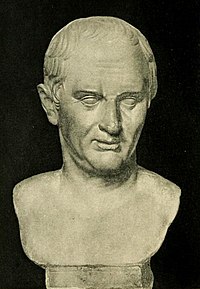Vicipaedia:De Latinitate/en
 This is the English translation of the parent page (as per revision 1930177[diff]).
This is the English translation of the parent page (as per revision 1930177[diff]).

Introduction recensere
This is a Latin encyclopedia, therefore pages must be written in Latin (which means good Latin).
Talk freely in whichever language you prefer in discussion pages, in your user page, in the Taberna, or in our Embassy.
Sometimes you will find that there is English on our Vicipaedia policy pages, as English is widely understood throughout the world.
Deletion (and how to avoid it) recensere
Pages that are not written in Latin face deletion.
- Romance languages are not Latin. If you want to give information in Spanish, for example, edit the Spanish Wikipedia instead.
- Latin isn't easy. Translation programs don't produce acceptable Latin.
- Pages that make no sense, or whose Latin is painfully bad, are likely to be deleted.
So, if you have written a page in very bad Latin, or using a translation program, don't complain if it is deleted.
If you can't write Latin, add la-0 in a Babel box on your user page. If you are writing a Vicipaedia article although your Latin is weak, add the "beginner" template {{tiro}} at the top. If you do this, you will find other users willing and happy to give time and effort to helping you.
Proper names recensere
- For more details see Translating proper names
- As a general rule, forenames are Latinized; surnames remain unchanged.
- "Latinizing" means transferring the name to an equivalent Latin form if there is one: thus Ronald becomes Ronaldus.
- Place names are given in Latin if the place has a Latin name (ancient, medieval or modern). See Sources for Latin place names for help in finding them. If there has been no Latin name, don't try to invent one; use the current geographical name.
- If, in the text of an article, you need to use a non-Latin name, write it in italics.
- Greek names are transliterated into Latin using the traditional Roman system (details here). On transliterating other scripts, see Transliteration.
Good and bad Latin recensere
We use templates in evaluating the Latin of Vicipaedia pages.
- Levels of Latinity are used to evaluate whole pages for good or bad Latin
- {{tiro}} is added by beginners to newly written pages as a request for help with their Latin
- {{dubsig}} marks a single word whose Latinity is doubtful
- <ref>{{Fontes desiderati}}</ref> is added if a Latin proper name needs a reference to confirm it.
Please help to improve the Latinity of Vicipaedia! Then, at the top of any page that is longer than a stub, make sure that the appropriate level is marked:
- {{L1}} = Good Latin (please correct any remaining errors)
- {{L}} = Latinity not yet verified (please change this to one of the other grades)
- {{Latinitas|-1}} = Latin to be improved
- {{Latinitas|-2}} = Latinity doubtful
- {{Latinitas|-3}} = Latinity very doubtful
- {{Latinitas|-4}} = Latinity poor
- {{Latinitas|-5}} = Latinity very poor
You can find lists of pages so marked:
- {{L1}} here
- {{L}} here
- {{Latinitas|-1}} here
- {{Latinitas|-2}} here
- {{Latinitas|-3}} here
- {{Latinitas|-4}} here
- {{Latinitas|-5}} here
Whenever you make a new page that is longer than a stub, please add a Latinity marking at the top. The creator should not add {{L1}}: leave it for the next editor to do that. As creator, please add {{L}}; or, if you are sure that your Latin is not very good, add a lower level such as {{Latinitas|-2}}.
Vide etiam recensere
- Praefatio
- De recensendo
- Structura paginae
- Hierarchia paginarum
- Qualitas paginarum
- De orthographia
- De Latinitate
- De nominibus propriis
- Fontes nominum Latinorum
- De bibliographiis etc.
- De categoriis
- Tutela Vicipaediae
- Formulae
- Paginae novae
- Paginae speciales
- Paginae non annexae
- Omnes paginae
- Categoriarum caput
- Categoriarum arbor
- Categoriae paginarum admeliorandarum
- Harenarium